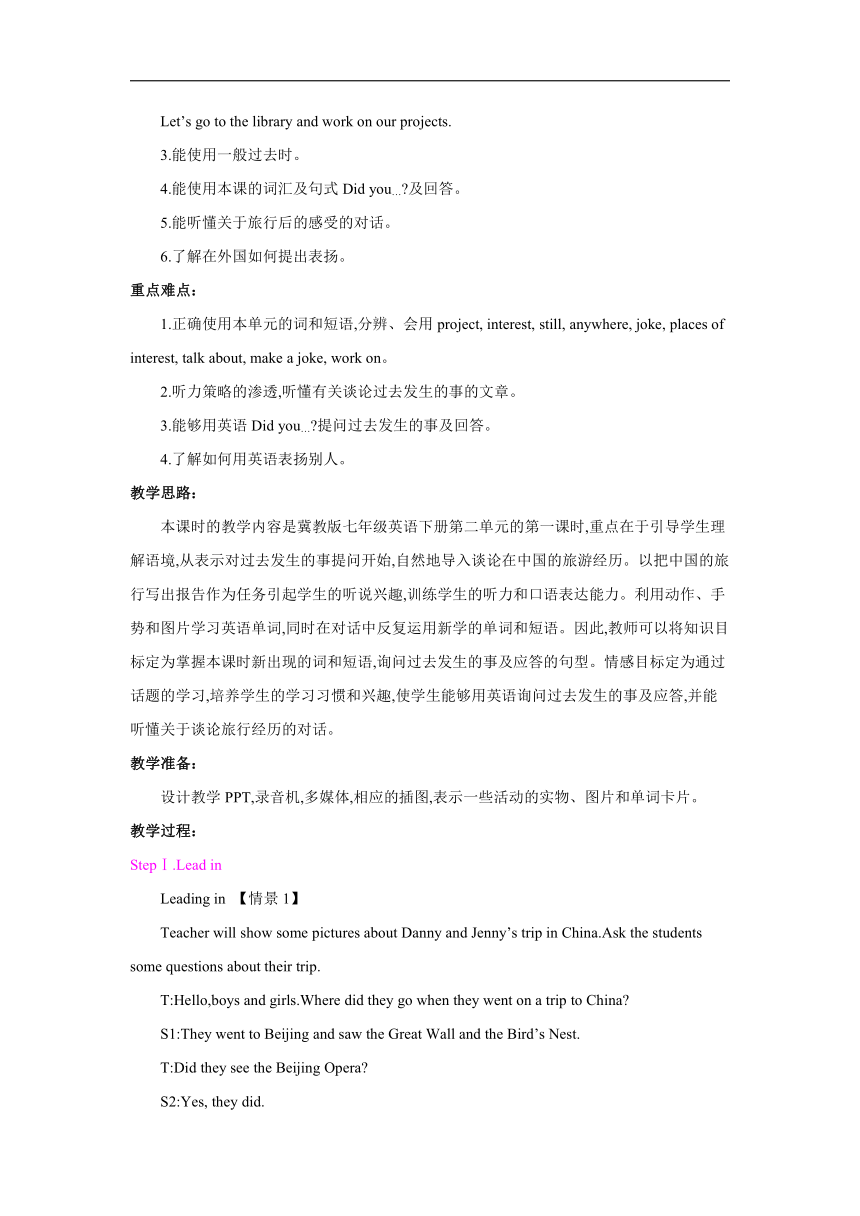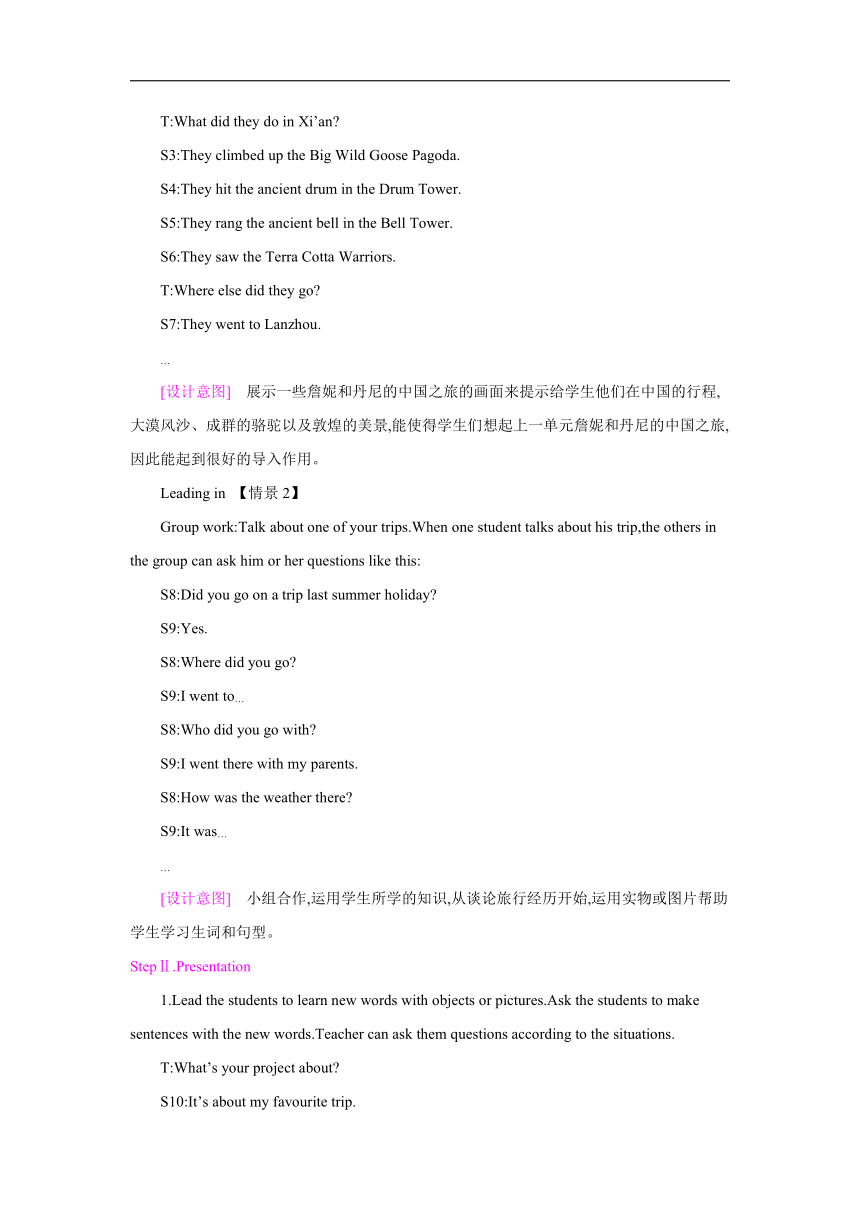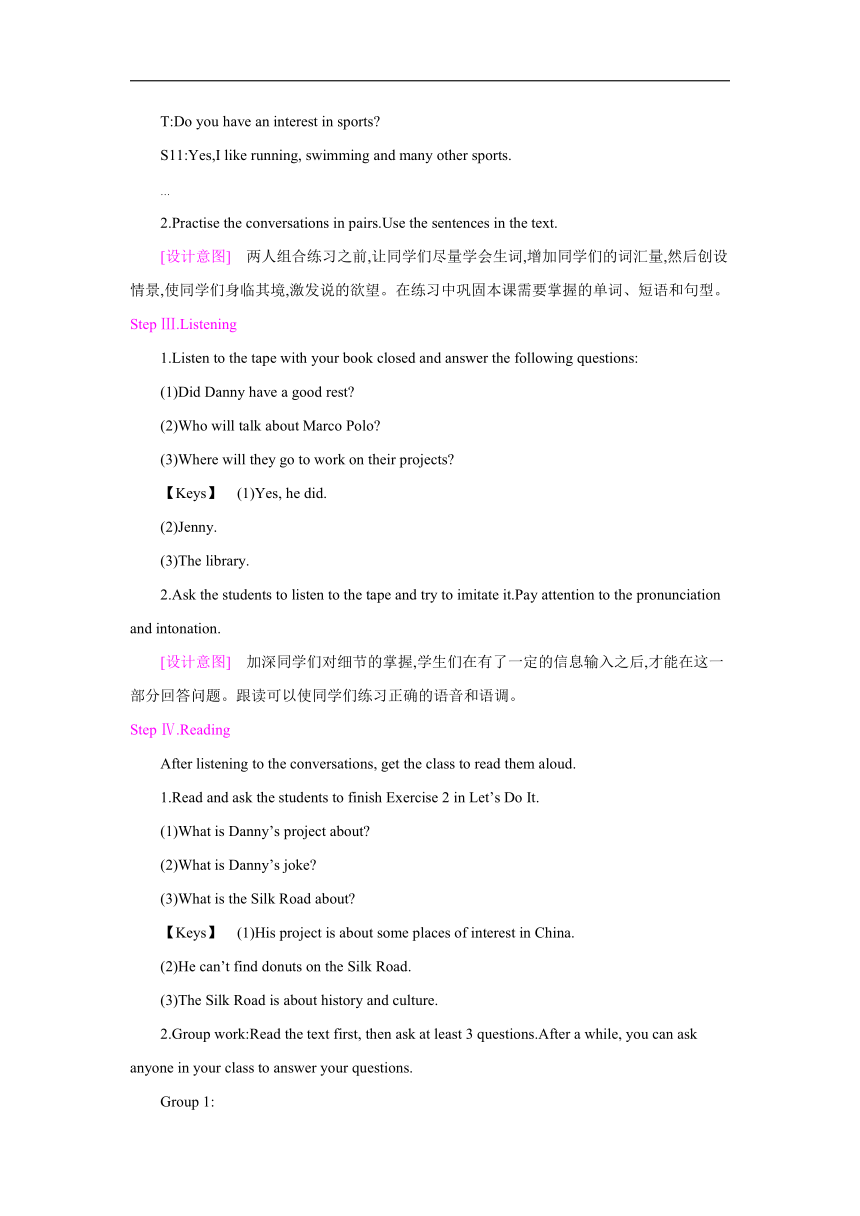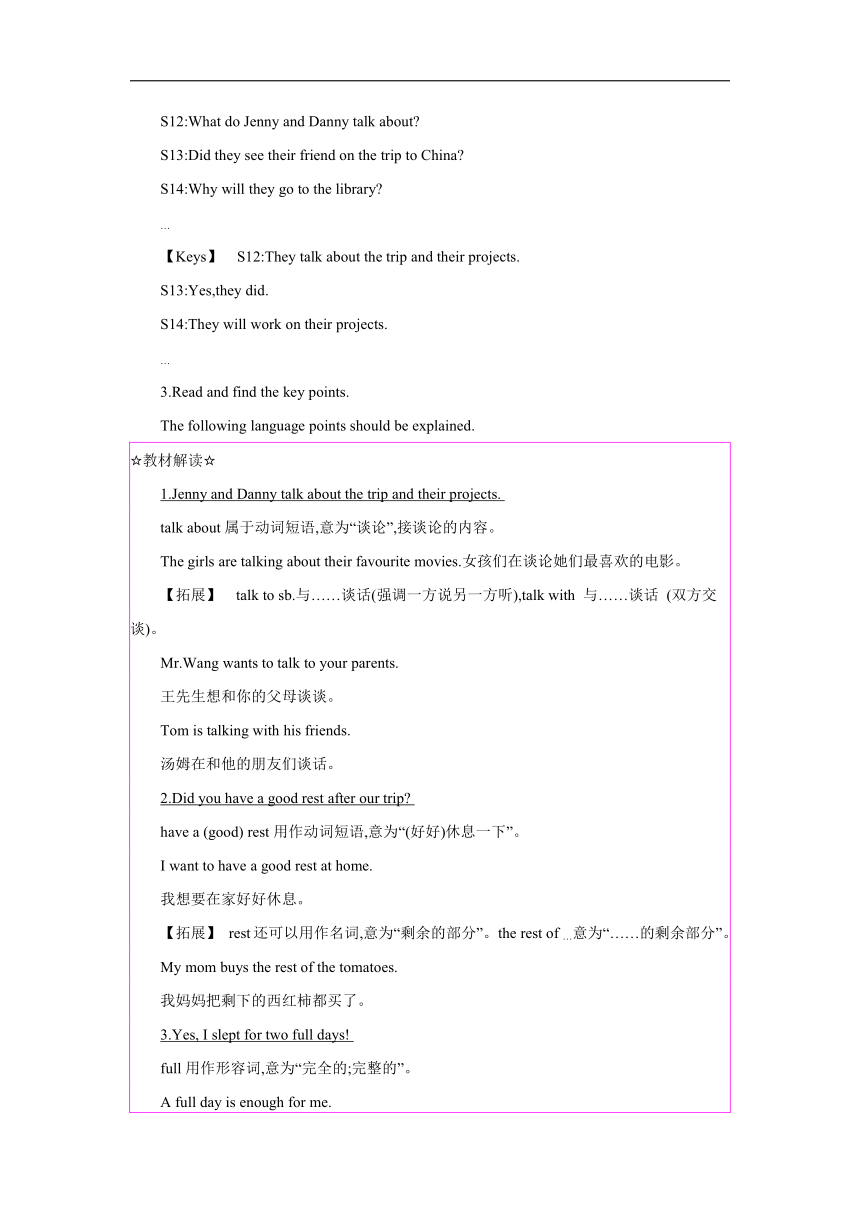Unit 2 It's Show Time! Lesson 7 What’s Your Project about? 教学设计
文档属性
| 名称 | Unit 2 It's Show Time! Lesson 7 What’s Your Project about? 教学设计 |

|
|
| 格式 | zip | ||
| 文件大小 | 33.9KB | ||
| 资源类型 | 教案 | ||
| 版本资源 | 冀教版 | ||
| 科目 | 英语 | ||
| 更新时间 | 2019-06-26 00:00:00 | ||
图片预览





文档简介
Lesson 7 What's Your Project about?
教学目标:
1.掌握单词:project, interest, still, anywhere, joke
短语:places of interest, talk about, make a joke, work on
2.掌握和运用谈论旅行后的感受的句型:
—Did you have a good rest after our trip?
—Yes,I slept for two full days!I feel good now.
We had a great trip.
—Are you ready for your project?
—Yes,I am.
—What’s your project about?
—My project is about some places of interest in China.
I will talk about the places and things on the trip.
Let’s go to the library and work on our projects.
3.能使用一般过去时。
4.能使用本课的词汇及句式Did you…?及回答。
5.能听懂关于旅行后的感受的对话。
6.了解在外国如何提出表扬。
教学内容:
1.学会运用讨论旅行后的感受的词或短语:project, interest, still, anywhere, joke, places of interest, talk about, make a joke, work on。
2.学会谈论旅行后的感受的句型:
—Did you have a good rest after our trip?
—Yes,I slept for two full days!I feel good now.
We had a great trip.
—Are you ready for your project?
—Yes,I am.
—What’s your project about?
—My project is about some places of interest in China.
I will talk about the places and things on the trip.
Let’s go to the library and work on our projects.
3.能使用一般过去时。
4.能使用本课的词汇及句式Did you…?及回答。
5.能听懂关于旅行后的感受的对话。
6.了解在外国如何提出表扬。
重点难点:
1.正确使用本单元的词和短语,分辨、会用project, interest, still, anywhere, joke, places of interest, talk about, make a joke, work on。
2.听力策略的渗透,听懂有关谈论过去发生的事的文章。
3.能够用英语Did you…?提问过去发生的事及回答。
4.了解如何用英语表扬别人。
教学思路:
本课时的教学内容是冀教版七年级英语下册第二单元的第一课时,重点在于引导学生理解语境,从表示对过去发生的事提问开始,自然地导入谈论在中国的旅游经历。以把中国的旅行写出报告作为任务引起学生的听说兴趣,训练学生的听力和口语表达能力。利用动作、手势和图片学习英语单词,同时在对话中反复运用新学的单词和短语。因此,教师可以将知识目标定为掌握本课时新出现的词和短语,询问过去发生的事及应答的句型。情感目标定为通过话题的学习,培养学生的学习习惯和兴趣,使学生能够用英语询问过去发生的事及应答,并能听懂关于谈论旅行经历的对话。
教学准备:
设计教学PPT,录音机,多媒体,相应的插图,表示一些活动的实物、图片和单词卡片。
教学过程:
StepⅠ.Lead in
Leading in 【情景1】
Teacher will show some pictures about Danny and Jenny’s trip in China.Ask the students some questions about their trip.
T:Hello,boys and girls.Where did they go when they went on a trip to China?
S1:They went to Beijing and saw the Great Wall and the Bird’s Nest.
T:Did they see the Beijing Opera?
S2:Yes, they did.
T:What did they do in Xi’an?
S3:They climbed up the Big Wild Goose Pagoda.
S4:They hit the ancient drum in the Drum Tower.
S5:They rang the ancient bell in the Bell Tower.
S6:They saw the Terra Cotta Warriors.
T:Where else did they go?
S7:They went to Lanzhou.
…
[设计意图] 展示一些詹妮和丹尼的中国之旅的画面来提示给学生他们在中国的行程,大漠风沙、成群的骆驼以及敦煌的美景,能使得学生们想起上一单元詹妮和丹尼的中国之旅,因此能起到很好的导入作用。
Leading in 【情景2】
Group work:Talk about one of your trips.When one student talks about his trip,the others in the group can ask him or her questions like this:
S8:Did you go on a trip last summer holiday?
S9:Yes.
S8:Where did you go?
S9:I went to…
S8:Who did you go with?
S9:I went there with my parents.
S8:How was the weather there?
S9:It was…
…
[设计意图] 小组合作,运用学生所学的知识,从谈论旅行经历开始,运用实物或图片帮助学生学习生词和句型。
StepⅡ.Presentation
1.Lead the students to learn new words with objects or pictures.Ask the students to make sentences with the new words.Teacher can ask them questions according to the situations.
T:What’s your project about?
S10:It’s about my favourite trip.
T:Do you have an interest in sports?
S11:Yes,I like running, swimming and many other sports.
…
2.Practise the conversations in pairs.Use the sentences in the text.
[设计意图] 两人组合练习之前,让同学们尽量学会生词,增加同学们的词汇量,然后创设情景,使同学们身临其境,激发说的欲望。在练习中巩固本课需要掌握的单词、短语和句型。
Step Ⅲ.Listening
1.Listen to the tape with your book closed and answer the following questions:
(1)Did Danny have a good rest?
(2)Who will talk about Marco Polo?
(3)Where will they go to work on their projects?
【Keys】 (1)Yes, he did.
(2)Jenny.
(3)The library.
2.Ask the students to listen to the tape and try to imitate it.Pay attention to the pronunciation and intonation.
[设计意图] 加深同学们对细节的掌握,学生们在有了一定的信息输入之后,才能在这一部分回答问题。跟读可以使同学们练习正确的语音和语调。
Step Ⅳ.Reading
After listening to the conversations, get the class to read them aloud.
1.Read and ask the students to finish Exercise 2 in Let’s Do It.
(1)What is Danny’s project about?
(2)What is Danny’s joke?
(3)What is the Silk Road about?
【Keys】 (1)His project is about some places of interest in China.
(2)He can’t find donuts on the Silk Road.
(3)The Silk Road is about history and culture.
2.Group work:Read the text first, then ask at least 3 questions.After a while, you can ask anyone in your class to answer your questions.
Group 1:
S12:What do Jenny and Danny talk about?
S13:Did they see their friend on the trip to China?
S14:Why will they go to the library?
…
【Keys】 S12:They talk about the trip and their projects.
S13:Yes,they did.
S14:They will work on their projects.
…
3.Read and find the key points.
The following language points should be explained.
☆教材解读☆
1.Jenny and Danny talk about the trip and their projects.?
talk about属于动词短语,意为“谈论”,接谈论的内容。
The girls are talking about their favourite movies.女孩们在谈论她们最喜欢的电影。
【拓展】 talk to sb.与……谈话(强调一方说另一方听),talk with 与……谈话 (双方交谈)。
Mr.Wang wants to talk to your parents.
王先生想和你的父母谈谈。
Tom is talking with his friends.
汤姆在和他的朋友们谈话。
2.Did you have a good rest after our trip??
have a (good) rest用作动词短语,意为“(好好)休息一下”。
I want to have a good rest at home.
我想要在家好好休息。
【拓展】 rest还可以用作名词,意为“剩余的部分”。 the rest of …意为“……的剩余部分”。
My mom buys the rest of the tomatoes.
我妈妈把剩下的西红柿都买了。
3.Yes, I slept for two full days!?
full用作形容词,意为“完全的;完整的”。
A full day is enough for me.
一整天对我来说就足够了。
【拓展】 full用作形容词,还有“满的;饱的”的意思,它的反义词是empty/hungry。be full of=be filled with,意为“充满了”。
The bottle is full of water.
= The bottle is filled with water.
瓶子里装满了水。
4.Are you ready for your project? ?
be ready for…意为“为……做好准备”,介词for后加名词或代词。
Li Ming, we are ready for the exam.What about you? 李明,我们为考试做好准备了。你呢?
【拓展】 be ready to do something 表示“准备好做某事,乐意做某事”。
We are all ready to go on the trip to Dunhuang.我们都准备去敦煌旅游。
She is always ready to help people.
她总是乐于助人。
5.You can find donuts anywhere in Canada.?
anywhere属于副词,在句中意为“任何地方”,用于肯定句。
Sit anywhere.随便坐。
Just put it down anywhere.
就把它随便放个地方。
【拓展】 (1)anywhere还可以用于否定句、疑问句或条件句中,用以代替 somewhere, 意为“在 (往)什么地方”,“在 (往)任何地方”。
I cannot find it anywhere.
我在什么地方都没找到它。
Are you going anywhere tonight?
今晚你要去什么地方吗?
If you go anywhere, take me with you.
你要是去什么地方,带我一起去。
(2)若是要肯定地说某个地方,应用 somewhere。
I think I saw it somewhere.
我想我在什么地方见过它。
6.I’m making a joke.?
joke用作名词,意为“玩笑”,常用短语:make a joke意为“开玩笑”;play a joke on sb.意为“戏弄某人”。
He likes to play jokes.他喜欢开玩笑。
Don’t play a joke on your sister.
不要戏弄你妹妹。
【拓展】 joke还可以用作动词,意为“开玩笑”。
I’m only joking.我只是开玩笑。
[设计意图] 学生在听了细节之后,朗读巩固,训练学生的语音、语调;再根据课文内容提出问题,增加学生对课文的理解程度。
Step Ⅴ.Practice
1.Ask the students to read the dialogue in roles.Students read the passage aloud.Focus on the stressed words, pronunciation and intonation.
2.Ask some students to act the dialogue out in front of the class.
3.Practice the Simple Past Tense.Ask the students to make sentences with the regular and irregular verbs.
Irregular Verbs:sleep—slept have—had see—saw do—did
Regular Verbs:learn—learned
…
[设计意图] 模仿对话,编出自己的对话,培养学生运用目标语言进行交际的能力;让同学们用一般过去时造句,掌握规则动词和不规则动词的过去式。
Step Ⅵ.Complete Let’s Do It!
Ask the students to finish Exercise 1.Listen to the dialogue and write true (T) or false (F).We have finished Exercise 2 in class.Ask the students to finish Exercise 3 and Exercise 4 in class.Check the answers in class.
[设计意图] Let’s Do It!部分中的Exercise 1重点是听力教学,了解课文的基本内容。Exercise 2是根据课文内容回答问题,我们在阅读部分已经完成了。Exercise 3考查同学们对单词的理解程度,Exercise 4考查同学们对整篇课文的理解程度。
Step Ⅶ.Task
Group work:Let’s Do It! Exercise 4
Work in groups.Ask the students to discuss the places of interest in your city.Write about a place of interest you know and draw a picture of it.
Task tips:Where is the place of interest? What is the name of it? Why is it special? How old is it?
Example:
S15:What’s the place of interest in our city?
S16:It’s…
S15:Where is it?
S16:It’s in …
S15:Why is it special?
S16:Because it has many …and …
S15:How old is it?
S16:It’s … years old.
Work in groups to finish Exercise 4.After a while, ask some pairs to act their dialogues out in front of the class.
[设计意图] Exercise 4的重点是练习描述自己所在的城市的名胜古迹,提供了一个同学们交流的平台,自然呈现本单元的核心句型,为学生进一步输出语言提供了口语示范。
Step Ⅷ.Exercises
Fill in the blanks.
1.在我们这个城市,有许多名胜古迹。
There are many in our city.?
2.我上周听说了这个歌手的很多事。
I a lot the singer last week.?
3.你昨天晚上休息得好吗?
Did you last night??
4.约翰不喜欢开玩笑。
John doesn’t like .?
5.我们班同学在讨论一个关于食物的课题。
Our class are a project about food.?
【Keys】 1.places of interest 2.heard, about 3.have a good rest 4.making jokes 5.talking about
[设计意图] 以学评教、强化落实。当堂检测主要是由本节内容组成的形成性评价,检测本课的重点单词、短语和句型,让学生们得到充分的训练。
Step Ⅸ.Homework
1.Review and recite the important points of Lesson 7.
2.Write a passage of one of your favourite trips.
3.Preview Lesson 8.
[设计意图] 口头练习和单词记忆相结合,复习、归纳,注重语言知识的操练与积累。
Lesson 7 What’s Your Project about?
project, interest,still, anywhere, joke,
places of interest, talk about, make a joke, work on
—Did you have a good rest after our trip?
—Yes,I slept for two full days!I feel good now.
We had a great trip.
—Are you ready for your project?
—Yes,I am.
—What’s your project about?
—My project is about some places of interest in China.
I will talk about the places and things on the trip.
Let’s go to the library and work on our projects.
【Keys】
1 1.F 2.T 3.F
3 joke—something people say to make others laugh
project—a task for school
history—things that happened in the past
culture—the traditions and beliefs of a group of people
anywhere—any place
4 trip, slept, projects, history, culture
教学目标:
1.掌握单词:project, interest, still, anywhere, joke
短语:places of interest, talk about, make a joke, work on
2.掌握和运用谈论旅行后的感受的句型:
—Did you have a good rest after our trip?
—Yes,I slept for two full days!I feel good now.
We had a great trip.
—Are you ready for your project?
—Yes,I am.
—What’s your project about?
—My project is about some places of interest in China.
I will talk about the places and things on the trip.
Let’s go to the library and work on our projects.
3.能使用一般过去时。
4.能使用本课的词汇及句式Did you…?及回答。
5.能听懂关于旅行后的感受的对话。
6.了解在外国如何提出表扬。
教学内容:
1.学会运用讨论旅行后的感受的词或短语:project, interest, still, anywhere, joke, places of interest, talk about, make a joke, work on。
2.学会谈论旅行后的感受的句型:
—Did you have a good rest after our trip?
—Yes,I slept for two full days!I feel good now.
We had a great trip.
—Are you ready for your project?
—Yes,I am.
—What’s your project about?
—My project is about some places of interest in China.
I will talk about the places and things on the trip.
Let’s go to the library and work on our projects.
3.能使用一般过去时。
4.能使用本课的词汇及句式Did you…?及回答。
5.能听懂关于旅行后的感受的对话。
6.了解在外国如何提出表扬。
重点难点:
1.正确使用本单元的词和短语,分辨、会用project, interest, still, anywhere, joke, places of interest, talk about, make a joke, work on。
2.听力策略的渗透,听懂有关谈论过去发生的事的文章。
3.能够用英语Did you…?提问过去发生的事及回答。
4.了解如何用英语表扬别人。
教学思路:
本课时的教学内容是冀教版七年级英语下册第二单元的第一课时,重点在于引导学生理解语境,从表示对过去发生的事提问开始,自然地导入谈论在中国的旅游经历。以把中国的旅行写出报告作为任务引起学生的听说兴趣,训练学生的听力和口语表达能力。利用动作、手势和图片学习英语单词,同时在对话中反复运用新学的单词和短语。因此,教师可以将知识目标定为掌握本课时新出现的词和短语,询问过去发生的事及应答的句型。情感目标定为通过话题的学习,培养学生的学习习惯和兴趣,使学生能够用英语询问过去发生的事及应答,并能听懂关于谈论旅行经历的对话。
教学准备:
设计教学PPT,录音机,多媒体,相应的插图,表示一些活动的实物、图片和单词卡片。
教学过程:
StepⅠ.Lead in
Leading in 【情景1】
Teacher will show some pictures about Danny and Jenny’s trip in China.Ask the students some questions about their trip.
T:Hello,boys and girls.Where did they go when they went on a trip to China?
S1:They went to Beijing and saw the Great Wall and the Bird’s Nest.
T:Did they see the Beijing Opera?
S2:Yes, they did.
T:What did they do in Xi’an?
S3:They climbed up the Big Wild Goose Pagoda.
S4:They hit the ancient drum in the Drum Tower.
S5:They rang the ancient bell in the Bell Tower.
S6:They saw the Terra Cotta Warriors.
T:Where else did they go?
S7:They went to Lanzhou.
…
[设计意图] 展示一些詹妮和丹尼的中国之旅的画面来提示给学生他们在中国的行程,大漠风沙、成群的骆驼以及敦煌的美景,能使得学生们想起上一单元詹妮和丹尼的中国之旅,因此能起到很好的导入作用。
Leading in 【情景2】
Group work:Talk about one of your trips.When one student talks about his trip,the others in the group can ask him or her questions like this:
S8:Did you go on a trip last summer holiday?
S9:Yes.
S8:Where did you go?
S9:I went to…
S8:Who did you go with?
S9:I went there with my parents.
S8:How was the weather there?
S9:It was…
…
[设计意图] 小组合作,运用学生所学的知识,从谈论旅行经历开始,运用实物或图片帮助学生学习生词和句型。
StepⅡ.Presentation
1.Lead the students to learn new words with objects or pictures.Ask the students to make sentences with the new words.Teacher can ask them questions according to the situations.
T:What’s your project about?
S10:It’s about my favourite trip.
T:Do you have an interest in sports?
S11:Yes,I like running, swimming and many other sports.
…
2.Practise the conversations in pairs.Use the sentences in the text.
[设计意图] 两人组合练习之前,让同学们尽量学会生词,增加同学们的词汇量,然后创设情景,使同学们身临其境,激发说的欲望。在练习中巩固本课需要掌握的单词、短语和句型。
Step Ⅲ.Listening
1.Listen to the tape with your book closed and answer the following questions:
(1)Did Danny have a good rest?
(2)Who will talk about Marco Polo?
(3)Where will they go to work on their projects?
【Keys】 (1)Yes, he did.
(2)Jenny.
(3)The library.
2.Ask the students to listen to the tape and try to imitate it.Pay attention to the pronunciation and intonation.
[设计意图] 加深同学们对细节的掌握,学生们在有了一定的信息输入之后,才能在这一部分回答问题。跟读可以使同学们练习正确的语音和语调。
Step Ⅳ.Reading
After listening to the conversations, get the class to read them aloud.
1.Read and ask the students to finish Exercise 2 in Let’s Do It.
(1)What is Danny’s project about?
(2)What is Danny’s joke?
(3)What is the Silk Road about?
【Keys】 (1)His project is about some places of interest in China.
(2)He can’t find donuts on the Silk Road.
(3)The Silk Road is about history and culture.
2.Group work:Read the text first, then ask at least 3 questions.After a while, you can ask anyone in your class to answer your questions.
Group 1:
S12:What do Jenny and Danny talk about?
S13:Did they see their friend on the trip to China?
S14:Why will they go to the library?
…
【Keys】 S12:They talk about the trip and their projects.
S13:Yes,they did.
S14:They will work on their projects.
…
3.Read and find the key points.
The following language points should be explained.
☆教材解读☆
1.Jenny and Danny talk about the trip and their projects.?
talk about属于动词短语,意为“谈论”,接谈论的内容。
The girls are talking about their favourite movies.女孩们在谈论她们最喜欢的电影。
【拓展】 talk to sb.与……谈话(强调一方说另一方听),talk with 与……谈话 (双方交谈)。
Mr.Wang wants to talk to your parents.
王先生想和你的父母谈谈。
Tom is talking with his friends.
汤姆在和他的朋友们谈话。
2.Did you have a good rest after our trip??
have a (good) rest用作动词短语,意为“(好好)休息一下”。
I want to have a good rest at home.
我想要在家好好休息。
【拓展】 rest还可以用作名词,意为“剩余的部分”。 the rest of …意为“……的剩余部分”。
My mom buys the rest of the tomatoes.
我妈妈把剩下的西红柿都买了。
3.Yes, I slept for two full days!?
full用作形容词,意为“完全的;完整的”。
A full day is enough for me.
一整天对我来说就足够了。
【拓展】 full用作形容词,还有“满的;饱的”的意思,它的反义词是empty/hungry。be full of=be filled with,意为“充满了”。
The bottle is full of water.
= The bottle is filled with water.
瓶子里装满了水。
4.Are you ready for your project? ?
be ready for…意为“为……做好准备”,介词for后加名词或代词。
Li Ming, we are ready for the exam.What about you? 李明,我们为考试做好准备了。你呢?
【拓展】 be ready to do something 表示“准备好做某事,乐意做某事”。
We are all ready to go on the trip to Dunhuang.我们都准备去敦煌旅游。
She is always ready to help people.
她总是乐于助人。
5.You can find donuts anywhere in Canada.?
anywhere属于副词,在句中意为“任何地方”,用于肯定句。
Sit anywhere.随便坐。
Just put it down anywhere.
就把它随便放个地方。
【拓展】 (1)anywhere还可以用于否定句、疑问句或条件句中,用以代替 somewhere, 意为“在 (往)什么地方”,“在 (往)任何地方”。
I cannot find it anywhere.
我在什么地方都没找到它。
Are you going anywhere tonight?
今晚你要去什么地方吗?
If you go anywhere, take me with you.
你要是去什么地方,带我一起去。
(2)若是要肯定地说某个地方,应用 somewhere。
I think I saw it somewhere.
我想我在什么地方见过它。
6.I’m making a joke.?
joke用作名词,意为“玩笑”,常用短语:make a joke意为“开玩笑”;play a joke on sb.意为“戏弄某人”。
He likes to play jokes.他喜欢开玩笑。
Don’t play a joke on your sister.
不要戏弄你妹妹。
【拓展】 joke还可以用作动词,意为“开玩笑”。
I’m only joking.我只是开玩笑。
[设计意图] 学生在听了细节之后,朗读巩固,训练学生的语音、语调;再根据课文内容提出问题,增加学生对课文的理解程度。
Step Ⅴ.Practice
1.Ask the students to read the dialogue in roles.Students read the passage aloud.Focus on the stressed words, pronunciation and intonation.
2.Ask some students to act the dialogue out in front of the class.
3.Practice the Simple Past Tense.Ask the students to make sentences with the regular and irregular verbs.
Irregular Verbs:sleep—slept have—had see—saw do—did
Regular Verbs:learn—learned
…
[设计意图] 模仿对话,编出自己的对话,培养学生运用目标语言进行交际的能力;让同学们用一般过去时造句,掌握规则动词和不规则动词的过去式。
Step Ⅵ.Complete Let’s Do It!
Ask the students to finish Exercise 1.Listen to the dialogue and write true (T) or false (F).We have finished Exercise 2 in class.Ask the students to finish Exercise 3 and Exercise 4 in class.Check the answers in class.
[设计意图] Let’s Do It!部分中的Exercise 1重点是听力教学,了解课文的基本内容。Exercise 2是根据课文内容回答问题,我们在阅读部分已经完成了。Exercise 3考查同学们对单词的理解程度,Exercise 4考查同学们对整篇课文的理解程度。
Step Ⅶ.Task
Group work:Let’s Do It! Exercise 4
Work in groups.Ask the students to discuss the places of interest in your city.Write about a place of interest you know and draw a picture of it.
Task tips:Where is the place of interest? What is the name of it? Why is it special? How old is it?
Example:
S15:What’s the place of interest in our city?
S16:It’s…
S15:Where is it?
S16:It’s in …
S15:Why is it special?
S16:Because it has many …and …
S15:How old is it?
S16:It’s … years old.
Work in groups to finish Exercise 4.After a while, ask some pairs to act their dialogues out in front of the class.
[设计意图] Exercise 4的重点是练习描述自己所在的城市的名胜古迹,提供了一个同学们交流的平台,自然呈现本单元的核心句型,为学生进一步输出语言提供了口语示范。
Step Ⅷ.Exercises
Fill in the blanks.
1.在我们这个城市,有许多名胜古迹。
There are many in our city.?
2.我上周听说了这个歌手的很多事。
I a lot the singer last week.?
3.你昨天晚上休息得好吗?
Did you last night??
4.约翰不喜欢开玩笑。
John doesn’t like .?
5.我们班同学在讨论一个关于食物的课题。
Our class are a project about food.?
【Keys】 1.places of interest 2.heard, about 3.have a good rest 4.making jokes 5.talking about
[设计意图] 以学评教、强化落实。当堂检测主要是由本节内容组成的形成性评价,检测本课的重点单词、短语和句型,让学生们得到充分的训练。
Step Ⅸ.Homework
1.Review and recite the important points of Lesson 7.
2.Write a passage of one of your favourite trips.
3.Preview Lesson 8.
[设计意图] 口头练习和单词记忆相结合,复习、归纳,注重语言知识的操练与积累。
Lesson 7 What’s Your Project about?
project, interest,still, anywhere, joke,
places of interest, talk about, make a joke, work on
—Did you have a good rest after our trip?
—Yes,I slept for two full days!I feel good now.
We had a great trip.
—Are you ready for your project?
—Yes,I am.
—What’s your project about?
—My project is about some places of interest in China.
I will talk about the places and things on the trip.
Let’s go to the library and work on our projects.
【Keys】
1 1.F 2.T 3.F
3 joke—something people say to make others laugh
project—a task for school
history—things that happened in the past
culture—the traditions and beliefs of a group of people
anywhere—any place
4 trip, slept, projects, history, culture
同课章节目录
- Unit 1 A Trip to the Silk Road
- Lesson 1 A Trip to China
- Lesson 2 Meet You in Beijing
- Lesson 3 A Visit to Xi'an
- Lesson 4 A Visit to Lanzhou
- Lesson 5 Another Stop along the Silk Road
- Lesson 6 Jenny's Diary
- Unit 2 It's Show Time!
- Lesson 7 What's Your Project about?
- Lesson 8 Marco Polo and the Silk Road
- Lesson 9 Danny's School Project
- Lesson 10 Music and Dance
- Lesson 11 Food in China
- Lesson 12 A Blog about the Silk Road
- Unit 3 School Life
- Lesson 13 How Is School Going?
- Lesson 14 Jenny's School Life
- Lesson 15 Making a Difference
- Lesson 16 We Are with You!
- Lesson 17 School Science Fai
- Lesson 18 Teaching in China
- Unit 4 After-School Activities
- Lesson 19 A Dinner Date
- Lesson 20 Join Our Club!
- Lesson 21 What Is Your Club Type?
- Lesson 22 Big Plans for the Weekend
- Lesson 23 A Weekend with Grandma
- Lesson 24 How was Your Weekend?
- Unit 5 I Love Learning English!
- Lesson 25 A Phone Friend
- Lesson 26 Online Phone Calls
- Lesson 27 Amazing English
- Lesson 28 How Do I Learn English?
- Lesson 29 A Door to the World
- Lesson 30 Writing an E-mail in English
- Unit 6 Seasons
- Lesson 31 What Strange Weather!
- Lesson 32 I Can't Wait for Winter!
- Lesson 33 Kim's Favourite Season
- Lesson 34 Steven's Report
- Lesson 35 Surfing in Sydney
- Lesson 36 Spring in China
- Unit 7 Sports and Good Health
- Lesson 37 You Are What You Eat!
- Lesson 38 Stay Healthy!
- Lesson 39 Danny's Report
- Lesson 40 Move Your Body
- Lesson 41 Were People Healthy Then?
- Lesson 42 Know Yourself
- Unit 8 Summer Holiday Is Coming!
- Lesson 43 Have a Good Summer!
- Lesson 44 Volunteering in Summe
- Lesson 45 Baseball Season
- Lesson 46 Get Ready for Summer Holiday!
- Lesson 47 Summer Plans
- Lesson 48 Li Ming's Summer Holiday
